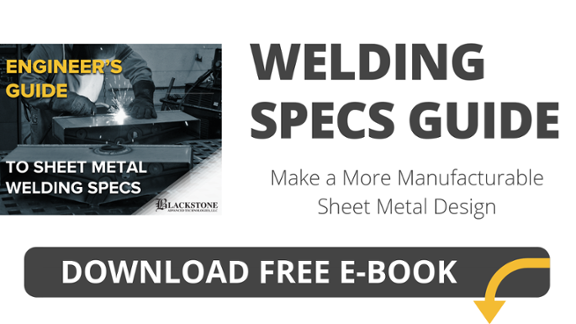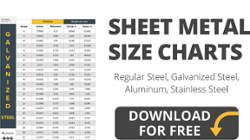
Aluminum, like steel, can be produced with many different physical and chemical properties. Some grades react well to welding. Others require more expertise or shouldn't be welded at all. So, how do you choose the best aluminum for welding?
Best Aluminum for Welding: What You Need to Know
First off, know that aluminum is generally more difficult to work with than carbon steel or stainless steel. It behaves much differently -- usually fussier.
Here are the problems that aluminum typically presents when welding:
- If the part has to be squared after welding, it can crack (due to heat distortion).
- It’s less malleable than steel.
- It’s easily affected by heat.
- It takes more skill to weld.
Since aluminum is relatively expensive, you’ll waste a lot of money by specifying a grade with low weldability.
Despite this, aluminum is still the material of choice for many engineers. It’s light, which makes it ideal for many applications. Since it’s a nonferrous metal, aluminum is also less corrosive and won’t rust (although it still corrodes in its own way -- just more slowly).
When you do decide on your aluminum grade, use a commonly produced aluminum grade for maximum cost-effectiveness. If there’s a lot of supply in the market, you’ll get a much better price.
Best Aluminum Grades for Welding
When you buy “aluminum,” you’re actually buying an aluminum alloy -- there are other metals in there, too. Those other metals give the aluminum properties that vary by grade.
The grades are separated into series, beginning with 1XXX and ending with 7XXX. Generally, higher numbers mean a higher percentage of magnesium.
APPLICATION |
RECOMMENDED ALUMINUM GRADES
|
||||
| Aircraft (structural, tube) | 2014 | 2024 | 5052 | 6061 | 7075 |
|
Architecture |
3003 | 6061 | 6063 | ||
| Auto -- parts | 2014 | 2024 | |||
| Auto -- frames & trailers | 2024 | 5052 | 6061 | 6063 | |
| Boats | 5052 | 6061 | |||
| Building products | 6061 | 6063 | |||
| Chemical equipment | 1100 | 6061 | |||
| Construction | 2024 | 6061 | 7075 | ||
| Cooking utensils | 3003 | 5052 | |||
| Drawn & spun parts | 1100 | 3003 | |||
| Electrical | 6061 | 6063 | |||
| Fasteners & fittings | 2024 | 6061 | |||
| General fabrication | 1100 | 3003 | 5052 | 6061 | |
| Machined parts | 2011 | 2014 | |||
| Marine | 5052 | 6061 | 6063 | ||
| Piping | 6061 | 6063 | |||
| Pressure vessels | 3003 | 5052 | |||
| Recreation equipment | 6061 | 6063 | |||
| Screw machine products | 2011 | 2024 | |||
| Sheet metal work | 1100 | 3003 | 5050 | 5052 | 6061 |
| Storage tanks | 3003 | 6061 | 6063 | ||
The series that hold up best to welding are 5XXX and 6XXX. "Is 6061 aluminum weldable?" is one of the most frequent questions we get. We most often use 5050 or 6061 aluminum, so the answer is "Definitely." Those two metals are very common, so availability and price shouldn’t be an issue.
Why these alloys? They’re the most forgiving. They have a lower level of magnesium, aren’t as thick, and are less likely to crack.
- 5XXX aluminums are useful if you need to weld high-strength material for structural and heavy-duty applications (i.e. shipbuilding). However, due to the high amounts of magnesium, they should NOT be welded with 4XXX filler metal.
- The 6XXX series includes alloys with magnesium and silicon. This series is used most widely for welding fabrications and is strong enough for buildings and other structures. 6XXX also responds well to heat treatment.
Grades That Are OK, But Not Optimal
Depending on your project, these other alloys may be suitable:
- The 1XXX series of alloys is 99% aluminum -- as close to pure as you'll get. It’s not very strong, but it’s highly resistant to corrosion. Translation: Don’t use it to hold up a building, but do use it to withstand chemicals.
- 3XXX series aluminums include manganese. They're malleable and easy to weld, and they often feature in heat-related applications (cookware; heat exchangers in vehicles and power plants). Their so-so strength precludes them from structural use.
- 4XXX alloys are highly weldable, but they're more often used as filler materials for other grades.
Don’t Even Think About These Grades
- 7XXX series aluminum grades should be handled by highly experienced welders due to their poor reaction to welding (with a few exceptions). In fact, you may want to totally avoid welding 7000 series aluminum. Hot cracking and stress corrosion are common issues. Specifically, 7075s are great alloys for marine applications thanks to their low density and steel-like strength. But they’re also temperamental and expensive, so they’re a poor investment for welding. In other words, a great alloy for your application does not equal a highly weldable alloy.
- 2XXX aluminums also react poorly to welding, so try to avoid specifying these. While the 2024 alloy is very common and immensely strong, it’s extremely crack-sensitive.
Talk to Your Vendor
5XXX and 6XXX series aluminum alloys are the best for welding overall. Remember that your project and application will ultimately determine which grade will work best.
With so many aluminum types to choose from, it’s best if you partner with a vendor in the design phase who knows all their pros and cons. And don’t forget to pick an appropriate filler metal -- you might be able to save some money!
(Editor's note: This article was originally posted in September 2017 and was recently updated.)




